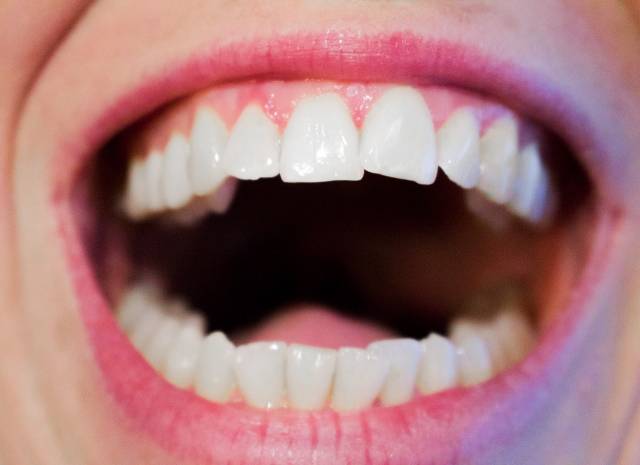Here Are 6 Things You Should Be Aware Of

Whether done at home or as a professional procedure, teeth whitening is a great way to brighten up your smile. However, if you have sensitive teeth, which is something that around 25-30% of the population experiences, here are six effects of whitening sensitive teeth that you need to be aware of.
1. Some Teeth Whitening Treatments Can Worsen Your Sensitivities
If you’ve ever noticed a warning on at-home teeth whitening products that say “not to be used on sensitive teeth”, there’s a reason for that…
The majority of teeth whitening products contain a bleaching agent, usually either hydrogen peroxide or carbamide peroxide. Professional treatments make use of a higher concentration of bleaching agents compared to at-home treatments, but any amount at all has the potential to irritate your teeth and exacerbate sensitivities.
This happens when the peroxide penetrates into your tooth enamel and reaches the dentine layer that houses your nerves. Since people with sensitive teeth usually already have some exposed dentine, the chances of the bleaching agent reaching this are much higher.
The exacerbation in sensitivity that this can cause is often temporary, but can sometimes be longer-lasting. You may also feel some gum irritation, another side effect that tends to be worse for those who have sensitive teeth.
Fortunately, there are now teeth whitening products out there designed specifically for sensitive teeth, often containing an enamel serum to provide extra protection, as well as strength. However, these aren’t 100% guaranteed to not worsen sensitive teeth, especially if your sensitivities are severe.
2. A Dental Professional Can Treat Sensitivities Before Whitening Your Teeth

Yes, teeth whitening can make sensitive teeth worse, but what if your teeth didn’t have to be quite so sensitive in the first place?
There are actually quite a few treatments out there that can help to treat sensitivity, such as:
- The application of fluoride to strengthen tooth enamel
- Applying a bonding resin to any exposed root surfaces
- A surgical gum graft
- A root canal
Sometimes, tooth sensitivity can be completely eliminated, meaning that teeth whitening treatments would not be a problem for you in the future.
3. Professional Treatments are Safer for Sensitive Teeth
There are so many at-home teeth whitening kits out there, often available so cheaply online. However, if you have sensitive teeth, it’s far better to go down the safer route…
A professional teeth whitening treatment may cost a little more, but many of the at-home kits often use incorrect concentrations when it comes to bleaching agents. Not only is this worse for sensitivities, but it can also lead to burns.
The mouth guards that are provided with certain teeth whitening treatments will also not fit your mouth correctly – after all, there isn’t a one-size-fits-all for teeth! This means that the bleaching agents won’t be held in the right place, which, as you can imagine, can be disastrous for those with sensitive teeth and gums, causing permanent damage.
When it comes to professional treatments, the bleaching agents will be applied directly by your dentist. Your dentist could also create a professional whitening kit for you, where impressions of your teeth will be used to create custom teeth whitening trays, giving you a much safer at-home treatment option.
Your dentist will also be able to recommend specific aftercare methods that will help to prevent sensitivities from arising while keeping any temporary discomfort to a minimum.
4. Brushing Your Teeth Immediately After Whitening Exacerbates Sensitivities
Even if you have your teeth professionally whitened, brushing them as soon as you return home can actually do more harm than good.
You may be tempted to get a head start on keeping those pearly whites squeaky clean, but brushing them after your treatment will only open up those exposed dentin pores even more, making it more likely that the bleaching agents from your treatment will reach your nerves.
Some of the commonly-used bleaching agents are also quite acidic, meaning that they can end up damaging your enamel if your teeth are brushed immediately afterwards.
You don’t need to wait too long – a couple of hours is usually all your teeth will need to recover, although you could leave it a little longer if your sensitivities are quite severe.
5. Whitening Effects Aren’t Permanent

Many are under the impression that teeth whitening is permanent, making those with sensitive teeth more likely to risk an option that may not be safe.
However, teeth whitening is a temporary treatment that can last from anywhere between a few months to a few years.
It all depends on the individual, as well as your lifestyle. For example, if you’re a smoker, or you love red wine, tea, or coffee, then these will end up staining your newly-whitened teeth pretty quickly. Using a straw can help, but you would still be more likely to need another whitening treatment sooner than someone who doesn’t drink those beverages.
There are also several aftercare techniques that you can do to prolong your whitened smile, such as:
- Avoiding acidic foods
- Brushing your teeth at least twice a day
- Flossing daily
- Using a whitening toothpaste a couple of times a week
6. There are Other Options Out There for a Brighter Smile
While teeth whitening may be the first thing you think of when looking for ways to brighten up your smile, there are other options out there, and they can often be much more suitable for sensitive teeth.
Veneers, either porcelain or composite-resin, are well worth considering.
Porcelain veneers are basically shells that fit over each tooth, perfectly matching your natural teeth in terms of shape and size, but with a whiter and brighter colour.
Composite-resin veneers have the same effect, but, rather than being a shell, they are bonded to each tooth. If your sensitivities are caused by a decrease in tooth enamel, then this could be a good option for you.
Just like with everything else out there, there are both safe and unsafe ways to whiten sensitive teeth. Although your sensitivities may mean that you aren’t suitable for some of the options most commonly used, there are still plenty of alternatives to choose from. A dental consultation for some customized advice is always a good place to start!
About the author
Dr. Fadi Swaida first graduated from the University of Western Ontario with an Honors BSc in Biology before graduating from the University of Manitoba’s Faculty of Dentistry. He is an active member of his church and enjoys football and being by the water! His outgoing personality and fun-loving character will ensure you always feel welcome at Dental Implants Clinic.